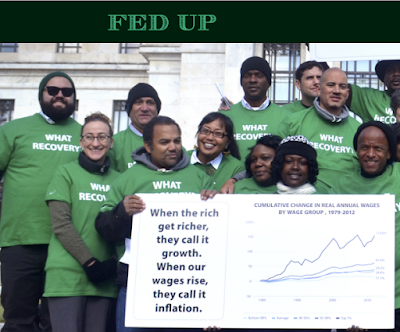Credit-related causes of the
Great Recession included: lax underwriting standards (abetted by government programs and the GSEs), overuse of ARMs (because the borrower couldn't qualify for a fixed rate note), too much cash-out financing and artificially low interest rates. Yet, the Wall Street factor (i.e. securitization of those obligations and excessive risk-taking) always seems to dominate the debate even though:
1) the Wall Street factor already gets most of the attention in the press,
2) regulatory reform for banks is a foregone conclusion,
3) Wall Street's culpability came
during and after credit issuance to subpar borrowers, not beforehand
.
It's the third point that is lost on some who look only at the Wall Street role in this disaster. The destruction could only have been possible with easy credit extended to in-over-their-heads borrowers, like our federal government that operates the same way -- in the
red.
Even today, many journalists treat sympathetically those homeowners who walk away from their mortgages when the principal amount owed, exceeds the current market value of a property. That's disturbing.
(Experts say, that between 20 and 25 percent of all outstanding mortgages in this country are under water.)
 |
Author User: Brendel at en.wikipedia.org
|
Excessive consumer debt and government debt affect the rest of us who keep our promises and pay our obligations. Yet some debtors and their advocates continue to ply us with excuses.
I have given you examples, but here's another one, which I'll call the
Jon Stewart excuse: You can't fault them because they were just "
optimistic" about the future. (If you're an optimistic borrower with bad credit and thus in need of an empathetic co-signer; please seek out Mr. Stewart.) I'm genuinely sympathetic to people who suffered tremendous misfortune that led their financial problems. Examples may include catastrophic medical issues, sudden job loss or sudden death of a primary wage maker. Their pain was
not self-induced. My belief, is that people in those unfortunate circumstances constitute a smaller percentage of the people defaulting on their obligations, than what's portrayed by media figures.
A new book by
Arthur C. Brooks called,
The Battle: How the Fight Between Free Enterprise and Big Government will Shape America's Future may add some perspective. The book is reviewed by Matthew Continetti in the June 21 issue of
National Review. Mr. Continetti, an associate editor at
The Weekly Standard in his article titled, "The Happiness of Pursuit" notes that Dr. Brooks thinks 30% of the American public believes "...
free enterprise is unfair and the government ought to do more to ensure equal outcomes" and that wealth redistribution is a justifiable anecdote.
Continetti notes that conservatives believe "
redistribution is inefficient, or unfair to those from whom the money is taken, or a recipe for unlimited government". He notes that Arthur Brooks has additional reasoning why redistribution fails in practice. Based upon what
Continetti calls an "abundance of empirical data" Brooks believes feelings of low self-worth, not inequality, actually make people unhappy and giving a man a fish not only won't help him fish, it won't help him feel good about himself either. Brooks believes that
earned success which he defines as, "
the ability to create value honestly" is a proven prescription for happiness.
According to Brooks, 30% of Americans believe that wealth redistribution is justified. That figure stuns me. Apparently 30% of us do not realize (or care) that continuing down this slope could have apocalyptic repercussions for our current way of life -- a way of life that enabled America to flourish in the first place. Perhaps despair and envy are the birth parents of Socialist states.

-p-500.jpg)













